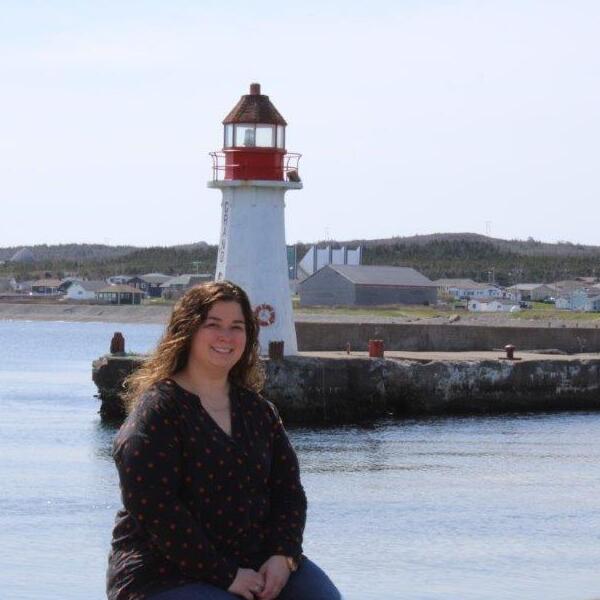Samantha Strowbridge
STEM Fields: Energy & Natural Resources, Skilled Trades
My Profile
Hometown(s)
Grand Bank NL
Current Community of Residence
Fortune NL
I consider myself to be
Pending
Social Media Connections
Links (LinkedIn, Facebook, Instagram)
My Education
Education
Certificates, Programs and School Names Master Mariner -Certificate of Competency| Transport Canada|Bachelor of Maritime Studies(Maritime Management)- MUN|Diploma of Nautical Science- Marine Institute
Get To Know Me
What do you love most about your profession? Why did you choose this career?
I love being at sea and maneuvering the vessel into the dock or alongside other vessels. I chose this career because ever since I can remember I have loved everything to do with the water whether it be swimming or going for little boat rides with my dad and uncles. Since I was 12 I said I wanted to be a Captain on a vessel I just wasn't sure which type I wanted to sail on at first.
How do you think the school you went to influenced your career?
As soon as I finished high school I began the Nautical Science program at the Marine Institute. The school is great and not only prepares you to start your career at sea but the instructors and staff are so great there that they will continue to help you after you graduate and continue your Transport Canada certification. The placement office also helps to get you a work term on the vessels you would like to try and helps find the best fit for each student. 10 years after graduating I still stay in contact with many people from the school and try to help out with any activity I can.
What was the best advice you have been given?
The best advice I was given was by my dad right before I started going to sea. He essentially told me that although I may not be as strong as a man I was smart and that would make up for the strength. He said for me to watch how others did the job and see as many ways to do the same job as I could. He told me I could learn bits and pieces of all the different ways and that then I could come up with my own way to do a job that required less strength. This advice was very helpful to me especially when I was working on deck and as 3rd mate where I spent a lot of time doing physically demanding jobs. Many Captains and others I worked with gave similar advice about how I could be smarter and not stronger to do the same job. I now like to explain this to everyone I meet onboard the vessels.
What was your first job? What skills from it continue to help you in your current role?
My first job was as a staff cadet with the Sea Cadets. I completed 2 years working on their training vessels as an engineer after I had completed their engineering program. Although I knew I wanted to work on the bridge and not in the engine room this was a great way to expand my knowledge of how the vessels worked. These courses helped a lot when it was time to complete engineering knowledge both in school and at Transport Canada. This job also helped raise my self-confidence and helped make me into an officer.
What does your typical workday involve? Can you work remotely? (indoors/outdoors, office/plant, travel time, teamwork/solo work)?
Typically my work schedule is a rotation of 28 days on the vessel and then 28 days home. This is great for me as right now it means I can work on the Pacific Coast of Canada while spending my off time home in Newfoundland. While on the vessel I usually work 4 hours on and then 8 hours off. Most of the crew work similar schedules. At the start of my day, I take part in the morning meeting where we discuss what each department has planned for the day to be sure no planned jobs interfere with one another and also so departments can arrange for help if needed. After the discussion is over we complete our stretches and everyone begins their work day. After this, I completed 1 of my 2 navigational watches for the day and fit in a bit of paperwork such as planned maintenance, orders, and general inquiries. While onboard we work every day and most times the same schedule this makes it very easy to get into a routine while onboard. I am in charge of completing the vessel stability and cargo operations as well as in charge of the deck operations, while sailing as Chief Officer I am one rank below the Captain which still remains my goal. During our off time, we find time to play cards with one another, walk around the vessel or go to the gym. We also try to arrange movie nights as well that most people can take part in. While working in BC I do travel a lot as I live about 4 hours outside of the nearest airport then the drive is followed by a flight across the country and vice versa.
Does your work make a difference in people’s lives and the world?
I like to think my work or really the vessels' work makes a difference in people's lives and the world. Right now the vessel I am on no longer works with the oil and gas industry off of St. John's but is now on contract with the Canadian Coast Guard as an Emergency Towing Vessel which is part of the Oceans Protection Plan. Essentially we stand by for ships that need towing when they have equipment failures to prevent incidents, we also stand by for any other emergencies such as search and rescue which is very important. We are often involved in environmental clean-ups too which is great and such a rewarding feeling.
What do you do for fun? What are some of your hobbies/activities?
For fun, I like to be outdoors at my cabin on ATV or Wave Runner. A new hobby of mine has also been to make Cricut projects. I enjoy helping out with renovations around the house.
What advice would you give students who might be considering a career like yours? What advice would you have given your younger self?
I always try to encourage students to try a career at sea if it is something they are interested in, it really is very rewarding and offers a great lifestyle where you can be off for 6 months of the year. The other side of that being that you are away from home for 6 months but I always like to think of it as the 6 months home are completely your time off aside from occasional training. The advice I would have given my younger self was to be more confident and not to be afraid to speak up when you need to.
Additional Info
No Additional Information


